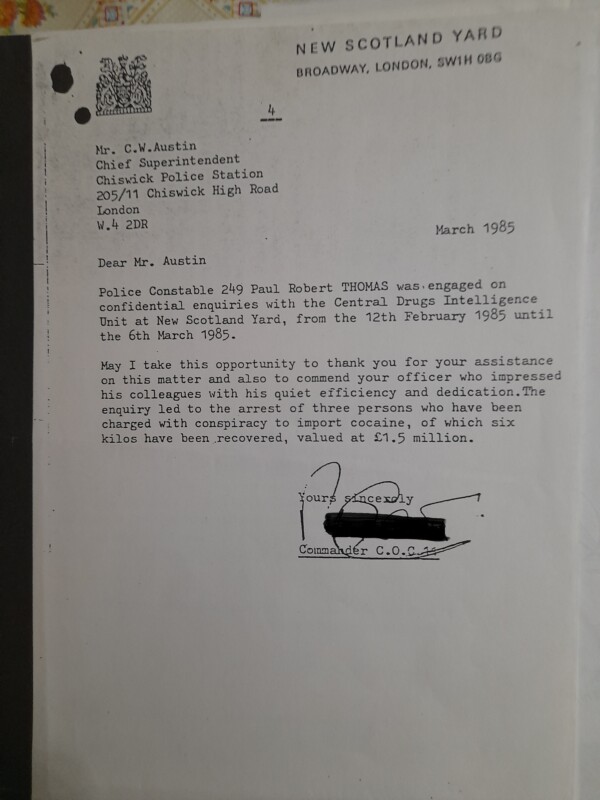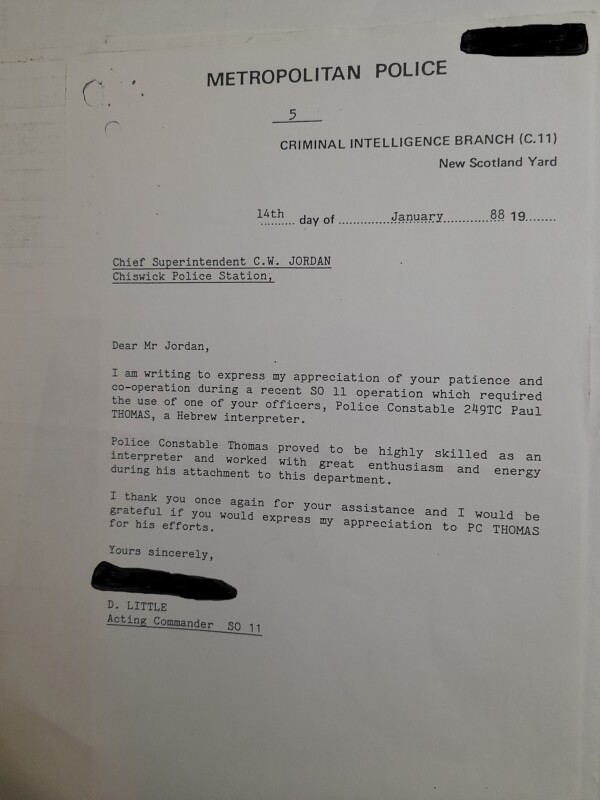Working for Special Branch, SO11 and M15
A few months after I had been posted to Chiswick, I was assigned for the first of a number of occassions to work at New Scotland Yard’s Central Drugs Intelligence Unit (C11 then, renamed C.O.C.11, and then later renamed S.O.11)) as a Hebrew interpreter. I was ‘Positively Vetted’ (it didn’t hurt one bit), and the nature of the work that I did is highly confidential. I was working in the SO11 office on my first assignment on January 26 1985, the sad day that the police colleagues of DC Fordham in our office were informed that DC John Fordham had been stabbed to death by Kenneth Noye whilst on survelience duty. I was called back to assist S.O.11 a month later on a different assignment, the results of which can be seen in the letter below from the Commander of C.O.C.O.11. I also was utilized by Special Branch and also by MI5 on short assignments using my Hebrew interpreting skills.
My wife was also utilized for her Hebrew interpreting and translation skills as a civilian employed by New Scotland Yard as a freelance official Hebrew interpreter and translator. She was called to police stations, mostly to assist in the interviews of shop lifters, but also to court to give evidence for a number of notable crimes including giving evidence at the Old Bailey in 1989 in the Knightsbridge Deposit Box Robbery trial.
I was very good at what I did, which was detecting and arresting criminals almost every day. I was sharp, alert and most of all hungry and I couldn’t wait to get out on patrol each day. When you consider that if you are a working police officer and not just a ‘uniform carrier’, then police work is invariably taken up by reams and reams of paper work, particularly if you arrest someone, and I suppose that I shouldn’t blame those officers that didn’t want to get involved as later when all my enthusiasm had been drained from me by the PTSD I was suffering from, coupled with the racism that I was facing from my ‘fellow officers’, I would almost become like them, almost but not totally!
I kept written records of my arrests and also of those where I would have arrested the offenders myself but I had given the arrest to a junior P.C. that I was patrolling with as part of their learning process. In 1991 I had achieved 164 arrests in that year (today I read about about police officers that haven’t even managed one arrest in a year), that averaged 1 arrest per day when you subtract annual leave days, days at court, days on football or demonstrations aid, days posted as Station Officer, as the operator on the Area Car (Tango One), Sport Days, various training and course dates and regular shield training days. At the station I got to turn around an arrest in about 2 hours on average, where other officers that also had arrests didn’t appear to be rushing to get back on the streets, and they seemed to take their whole shift time dealing with their prisoners, which of course meant overtime if they’d passed their 8 hours of duty, but I wasn’t really interested in that as I prefered to go home and see my family when my 8 hour shift was over. From the time of the arrest and of processing the prisoner, booking the prisoner in with the Custody Sergeant, interviewing the prisoner if necessary, fingerprinting/photographing him, charging him or cautioning him for the crime as necessary, and completing the necessary paperwork for the Crown Prosecution Service (for which I received a letter of commendation from the C.P.S. for the high standard of paperwork I submiited to them), I did it quickly but also professionally and afterwards I was then free to get back on patrol looking for further criminals to apprehend before my shift ended! I considered it my duty to protect the residents of Chiswick and to try to keep the streets crime-free and safe to walk during the day and night, that was what I was paid to do, wasn’t it?
I would study the stations reported crime sheets to find out where previous crimes had been committed and would pay attention to those particular areas of crime during my 8 hour shift. Of course the problem arose that when I was in the station processing a prisoner for a couple of hours or so, then the area of crime concern wasn’t being protected. Of course there might be other police officers driving around or patrolling out there on foot, but if these officers weren’t interested in the detection and apprehension of criminals, then the public I felt, rightly or wrongly were being let down. Night duty was 7 nights straight, Monday to Sunday 10 – 6 am and then on Monday returning to work on a ‘quick change over’ again at 2 pm after having finished the previous shift at 6 am. We had one officer on our relief who after parade at 10 pm would get in his panda, drive out of the back yard, drive across Chiswick High Road to the basement car park of an opposite office block and would sit or sleep there until 6 am the next morning. Often it was just him and me on parade and more often than not it was just me. He would listen to his police radio mostly and if there was a ‘mundane call’ then he would drive out and deal with it and then return to his nest. How did he get away with it, where were the supervisory officers, you tell me!
What I found it difficult to fathom was when I had hardly come across one member of the public walking on the streets of Chiswick during a night patrol and then before the next nights shift started I read that there had been 2 or 3 burglaries that same night! There were 1 or 2 ‘known burglars’ that I would regularly stop and talk to at night as they were walking around the streets of Chiswick, one in particular would either wear gloves or have them stuffed in his pocket and when asked why, he would invariably say that he was cold, albeit that it was in the height of summer. Does a well known and prolific burglar walking around the streets in the middle of the night wearing gloves in the summer justify stopping and searching him? I would say ‘yes, it certainly does’, but these criminals, even this particular teenager were very savvy and even if they had committed a burglary or burglaries a short while before you had stopped them, they knew that their chances of getting stopped by the police while on foot at night were high and so if they’re not driving a car, which is of course the usual way for them to make off with the proceeds of the burglary, then they would hide the stolen goods and any implements that they might have used for breaking into a property somewhere that wouldn’t be easily visible, but from where they could come back to during the day with a car or taxi and retrieve the stolen goods in a few minutes without attracting attention, and what better way to make off than in a taxi? I sometimes dealt with calls where house owners had discovered all manner of things that weren’t theirs hidden amongst the bushes in their front garden that then turned out after investigation to be the proceeds of a recent nearby burglary!
Another prevalent crime in the area was theft from motor vehicles, most of which occured during daylight but occassionally happened at night, and a trick the criminals used to avoid detection at night, and one that you might think sounds unbelievable but it worked, was if they heard police vehicles approaching they would lie down on their face in between a nearby dark coloured parked car and the pavement i.e. in the gutter and pull the dark jacket they were wearing over their head, believe me, unless you know that they are there, in a poorly lit street at night you won’t see them, the same applies if you are chasing a suspect and you turn a corner and they have disappeared, I have seen this in operation and the suspect was only caught after the officer literally almost fell over him not realizing that he was there!
Another of my favourites, was actually one of my easiest arrests, was when I was driving the station van with a junior PC as passenger and came up to a green traffic light, but noticed on my left a motorcycle driving up slowly up to his red traffic light and I don’t know why, instinct I guess, I drove up and stopped the police van right across his path and as soon as I did, and even with his crash helmet on, I recognized who it was and I told my junior PC to get out and open the police vans back doors, and I called to the motorcyclist, ‘Go on, jump in the back,’ and he got off his motorcycle, took his crash helmet off and walked across and got into the back of the police van, where I told the junior PC to arrest him for driving whilst disqualified and for TDA as he admitted to having just stolen the motorcycle and I knew him to be disqualified, and he said that he was on his was home to the next district to where he had recently moved. I had previously arrested him a number of times and I had told him that his regular Cannabis use would in all likelihood lead to harder stuff. The next day I went to see him in the cells under Brentford Magistrates Court where he had just been sentenced to a term in prison and he admitted that he was now on heroin. He did his time in prison for his offences and last I heard he was clean from crime and from drugs.



Recent Comments